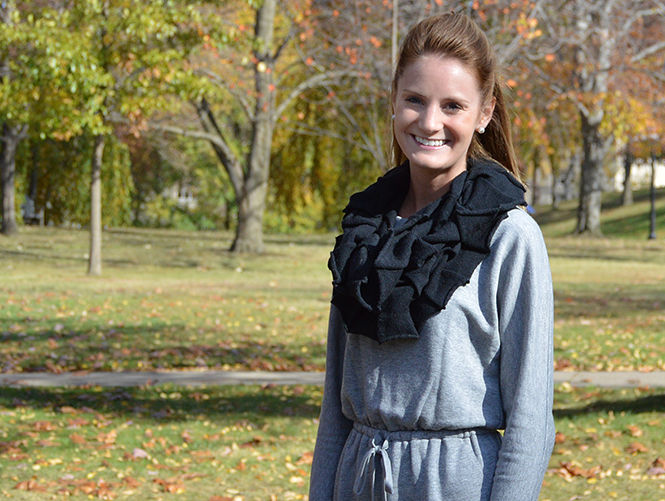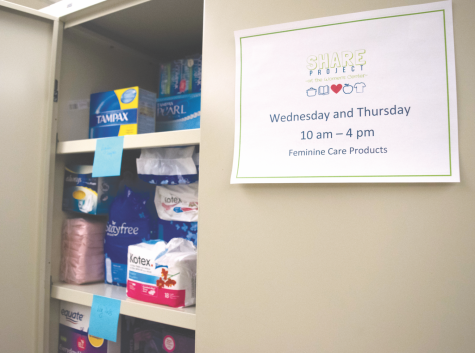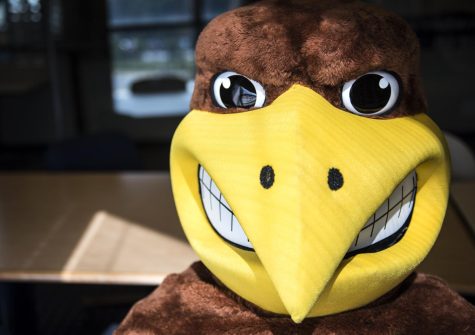Student-sponsored book drive gives low-income children a ‘head start’
Erika Taylor, senior human development and family studies major, is an intern for the Head Start Program at Portage Learning Centers. For her latest project with the center, she hopes to gather at least 1,000 children’s books for donation.
November 4, 2014
There’s no hiding it — Erika Taylor loves kids. In addition to attending Kent State for human development and family studies, she interns at the Portage Learning Centers, where she works as an aide in the Head Start program. Along side that, she babysits for four families.
“It does get kind of crazy sometimes,” she said.
Dealing with children 3 years old and younger, Taylor works alongside 12 other home-visiting teachers at Head Start’s precursor program, Early Head Start. As a teacher’s aide, Taylor pairs up with a full-time home visitor, traveling to the houses of low-income families to assist them and their children for a proper transition to preschool. Taylor is a part of what can be called “a certified day care on wheels.”
Head Start, a part of the U.S. Department of Health and Human Services, started in 1965, a byproduct of Lyndon B. Johnson’s Great Society and the War on Poverty. According to its website, Head Start’s founder, Jule Sugarman, initially envisioned it as a “catch-up summer school” where students could receive a helping hand before the coming school season. Its aim as a childhood necessity even crossed over to the world of television and backed many 1960s-era educational programs for kids. We know the most successful, today, as “Sesame Street.”
Today, Head Start claims over 1,700 agencies nationwide, including one serving Portage County. With a staff of five home visitors, the Portage Learning Center provides in-home education for more than 60 families, adding to the one million plus that Head Start serves annually.
Lugging around storage crates filled with arts and crafts supplies, snack-time treats and coloring books, Head Start home visitors are not just traveling teachers. Taylor said they are both an emotional support and an educational helping hand to mothers and their infants, who consider the aide a godsend for 90 minutes a week. Even prenatal mothers Taylor visits thank her for a sit-down chat and for the help around the house.
This tight-knit kinship with families, Taylor said, is a sure reward she experiences every time she walks into a participant’s home.
“It makes you feel really great because a lot of them truly want you there,” she said. “All of the families look forward to you coming to help.”
Now, this fall, Taylor is asking for a little in return.
In the middle of October, Taylor started her own book drive for the Head Start program to supply the non-profit with what she said is the most important tool for giving pre-preschools that educational bump. She has garnered the help of Kent State sororities and fraternities, along with help from her sisters in Delta Zeta, to hopefully meet her quota of 1,000 books by the end of the Thanksgiving holiday. Unfortunately, Taylor’s stack is numbered at around 30.
The importance of reading for kids is already a given, but Taylor said its component in the Head Start program is indispensable. Other than the several fostered or homeless children Taylor reads to — a favorite being “Cloudy With A Chance of Meatballs” — some of her students are children of non-native speakers, those who’ve grown up without English spoken around the home. One Arabic-speaking woman Taylor assists begs her for more children’s literature for a reason other than her infant’s speaking ability.
“They want to learn (English) themselves, and they also want their kids to learn it, as well,” Taylor said.
With 30 percent of Head Start’s program participants being non-native speakers and another 10 percent with disabilities, Taylor’s work is a little more than just play time. Language barriers can be frustrating, and overeager 2-year olds can be overbearing when Taylor-made lesson plans are neglected. One family, composed of three fostered and two adopted children, easily leads to craziness during visits, she said.
But Taylor’s easy-going persona welcomes just about every session with an almost guarantee of fun. Her love for kids even encouraged her to apply for full-time work as a home visitor after her December graduation. As far as kids go, the Kent State undergraduate said that she has a ballpark: five at least.
“You can never have a bad day working with kids,” she said. “If I miss a visit one day because I have class or something, I get sad because I miss them. I know it’s crazy, but it’s true.”
As far as Taylor’s book drive goes, she’s at a loss for ideas, and hopes the philanthropic spirit of the Kent State fraternities and sororities will pick up as November passes. She’s confident, but anxious due to her strong commitment to childhood education. Her plea for books is almost a given.
“Anything helps,” she said.
Any donations can be made by contacting Taylor at [email protected].
Contact Mark Oprea at [email protected].























